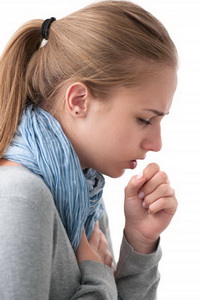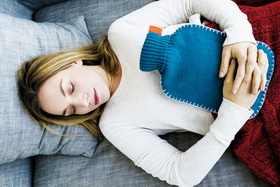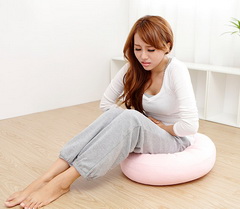Postpartum lochiorrhea and related syndromes:an introduction of postpartum lochiorrhea, lochiometra, residue blood flow upward and heartache,lochiorrhea with abdominal pain, and other related syndromes.
-
 ✵Gynecology of TCM is a branch to study the physiological and pathological characteristics of women and to prevent and treat syndromes specific to women. Gynecology of TCM research scope including irregular menstruation, amenia, metrorrhagia, infertility, postpartum syndromes, breast syndromes, and miscellaneous syndromes, etc.
✵Gynecology of TCM is a branch to study the physiological and pathological characteristics of women and to prevent and treat syndromes specific to women. Gynecology of TCM research scope including irregular menstruation, amenia, metrorrhagia, infertility, postpartum syndromes, breast syndromes, and miscellaneous syndromes, etc.
- Postpartum lochiorrhea and related syndromes.
-
✵The postpartum lochiorrhea syndromes are also known as lochiorrhea syndromes of women after childbirth, a series of lochiorrhea syndromes of women following childbirth. They are also known as lochiorrhea syndromes after childbirth.
✧ In the TCM system, the pathogenic reasons for the postpartum lochiorrhea syndromes normally are hurt from menses blood, deficiency of blood and Qi, or residue blood stays in the abdomen, cold pathogen affects Zang-viscera and Fu-viscera, etc. Common related symptoms observed are lochiorrhea, incessant extravasated blood, unstoppable uterine bleeding, or dribbling discharge, with abdominal pain, or pain from the heart to the abdomen, or cold pain around the belly button, deficiency and emaciation, etc. The lochiorrhea related syndromes are understood due to different reasons and also specific reasons, with different symptoms and specific symptoms observed.
✵The women lochiorrhea syndromes after childbirth, and lochiorrhea related syndromes are introduced: postpartum lochiorrhea, postpartum cough of lochia, postpartum lochiometra, postpartum lochiostasis, postpartum prolonged lochiorrhea, postpartum residue blood flow upward and heartache, postpartum lochiorrhea with abdominal pain, postpartum metrorrhagia(flooding), postpartum irregular menses, postpartum absence of menses, etc.
- Postpartum lochiorrhea.
-

✵The postpartum lochiorrhea, is a lochiorrhea syndrome occurring following childbirth, due to various pathogenic reasons. It is also known as lochiorrhagia after childbirth, or lochiorrhea after childbirth.
✧ In the TCM system, the pathogenic reasons for the postpartum lochiorrhea normally are due to hurt from menses blood, deficiency of blood and Qi, or residue blood stay in the abdomen, cold pathogen affect Zang-viscera and Fu-viscera, lead to disharmony between QI and blood, lead to lochiorrhea.
✵ The postpartum lochiorrhea common types are known including:
⑴.A woman suffers from postpartum lochiorrhea, incessant extravasated blood, unstoppable uterine bleeding, colic pain in the abdomen, panting or short of breath.
⑵...., unstoppable uterine bleeding, deficiency and emaciation, deficiency of Qi and blood.
⑶...., unstoppable uterine bleeding, abdominal pain, oppression in the chest and diaphragm.
⑷...., loss excessive volume of blood, pain from the heart to the abdomen, uterine bleeding, unstoppable in a long period. Sometimes with red or white morbid leucorrhea.
⑸...., deficiency and emaciation, cold pain around the belly button, incessant lochiorrhea, dribbling discharge, or lochiometra.
⑹...., incessant lochiorrhea and dribbling discharge, depressed and short of breath, weakness of limbs and fatigue, no appetite, dizziness and clouded head and vision, a feverish sensation of the five centers, yellowish complexion, and thin body.
✵Ancient herbalists who hold a syndrome differentiation viewpoint with similar explain of pathogenic reasons, and the relevant representative work are introduced and quoted:"Case a woman suffers from postpartum lochiorrhea, dripping and unstoppable, due to urinary bladder hurt..." [02].
"Lochia unstoppable after childbirth:...a woman suffers from the hurt of Chong channel after childbirth, deficiency of Qi and blood, lassitude and tiredness, old blood not passing down, new blood not collecting, passing down together, unstoppable in a long period, gradually develops to asthenia..." [06].Different types are introduced:
⑴.A woman suffers from lochia unstoppable after childbirth(lochiorrhea), dripping discharge is unstoppable over a month after childbirth;
⑵...., blood heat;
⑶...., Chong and Ren are hurt;
⑷...., Qi deficiency of the liver and spleen;
⑸...., Qi and blood are both deficient."Lochiorrhea after childbirth: in the case a woman suffers from lochiorrhea due to blood retention and stasis, gradually dripping discharge, or blood stasis already passing down, but the Chong channel and Ren channel are deficient and hurt, could not collect. In the case of blood stasis, the discharged blood is dark turbid smelly, ... In case of not collecting, the discharged blood is fresh, ..." [07].
- Postpartum cough of lochia.
-

✵The postpartum cough of lochia, is a cough syndrome occurring following childbirth, due to various pathogenic reasons and majorly due to lochia.
✵Ancient herbalists who hold a syndrome differentiation viewpoint with similar explain of pathogenic reasons, and the relevant representative work are introduced and quoted:"A woman suffers from cough after childbirth, due to lochia flow upward, flow into the spleen channel, lead to a cough. Its symptoms are distension and stagnancy in the chest and diaphragm..." [06].
- Postpartum lochiometra.
-

✵The postpartum lochiometra is the lochiometra(retention of the lochia) occurring following childbirth, due to various pathogenic reasons.
✧ In the TCM system, the pathogenic reasons for the postpartum lochiometra(retention of the lochia) normally are consumptive hurt of Zang-viscera and Fu-viscera, deficiency of Qi and blood, or cold pathogen affect the collaterals of the uterus, or cold and wind affection after childbirth, wind cold pathogen combat with blood in the deficiency, blood stagnant and not flow smoothly, accumulated at the interior, lead to retention of the lochia.
✵The postpartum lochiometra(retention of the lochia) common types are known including:
⑴.A woman suffers from postpartum lochiometra, in three to four days after childbirth, retching counterflow, hyperpyrexia(high fever).
⑵...., residue blood counter flow upward to the heart, retention of blood after childbirth, abdominal blood clot.
⑶...., pain in the abdomen, annoyed and vexed in heart and mind.
⑷...., pain in the abdomen, or abdominal clot and fever.
⑸...., lochiometra stopped suddenly, a sudden alternation between cold and fever, pain in the belly button and channels, similar to bore spine pain, this is the case of postpartum lochiometra due to disharmony of cold and heat, or thinking, the stagnancy of Qi, blood accumulation in channels.
- Postpartum lochiostasis.
-

✵The postpartum lochiostasis is the lochiostasis(stasis and stagnancy of lochia) occurring following childbirth, due to various pathogenic reasons. It is also known as E Lou Bu Xia(residue lochia do not flow down after childbirth).
✧ In the TCM system, the pathogenic reasons for the postpartum lochiostasis normally are endogenous cold pathogens or affection from exogenous cold pathogens, lead to residue lochia blood stagnancy and stasis.
✵Ancient herbalists who hold a syndrome differentiation viewpoint with similar explain of pathogenic reasons, and the relevant representative work are introduced and quoted:"A woman suffers from lochia could not flow down after childbirth(lochiostasis after childbirth), abdominal pain radiating to the low back, alternative chills and fever, is the condition due to old cold pathogens in the abdomen, or affection from new exogenous cold pathogens, as a result, residue blood stagnancy and stasis..." [05].Different types are introduced:
⑴.A woman suffers from lochiostasis after childbirth, accumulated into clots or mass, irritant and unhappy in the heart and chest, hard and pain below the belly button;
⑵...., affection from cold heat and strain, irritable pain in the backbone;
⑶...., alternative chills and fever, flustered palpitation and dazed, pain and ache in the abdomen;
⑷...., suddenly stopped, sudden chills and fever, stabbing pain in belly button abdomen, due to disorder of cold and heat, or worry and strain, Qi stagnancy blocking, blood is stored in collaterals;"Lochia not passing down after childbirth:...there are two syndromes, one due to coldness of the uterus, stagnancy stasis and not flows..., symptoms are distention and swelling in the lower abdomen, stabbing pain is unstoppable...; Or due to constitutional weakness of the spleen and stomach, deficiency of the middle Qi, residue blood volume is also less, lack in Qi and blocking of blood, could not passing down completely, symptoms are pains suddenly and suddenly stopped, not very pain..." [06].Different types are introduced:
⑴.A woman suffers from residue lochia not passing down after childbirth(lochiostasis), coldness in the uterus, stagnancy and stasis, symptoms are distention and fullness in the lower abdomen, stabbing pain unstoppable;
⑵.A woman suffers from residue lochia not passing down after childbirth(lochiostasis), deficiency and weakness of spleen and stomach, deficiency of the middle Qi, residue blood is not much, lack of Qi, suddenly pains and suddenly stopped, not very painful.
- Postpartum prolonged lochiorrhea.
-

✵The postpartum prolonged lochiorrhea is the prolonged lochiorrhea occurring following childbirth, due to various pathogenic reasons. It is also known as lochiorrhagia or lochiorrhea, sometimes it is also known as unstoppable lochiorrhea.
✧ In the TCM system, the pathogenic reasons for the postpartum prolonged lochiorrhea normally are loss of much blood, Qi collapse, blood heat, hurt the Ren and Chong collaterals, Qi deficiency of the liver and spleen, deficiency of Qi and blood, anger hurt the liver viscus, etc.
✵Ancient herbalists who hold a syndrome differentiation viewpoint with similar explain of pathogenic reasons, and the relevant representative work are introduced and quoted:"A woman suffers from prolonged lochiorrhea(unstoppable lochiorrhea), there are different syndromes, should be treated differently..." [05].Different types are introduced:
⑴.A woman suffers from prolonged lochiorrhea after childbirth, pain in the urethral canal;
⑵...., pass much blood, gradually emaciated and weak;
⑶...., discharge blood color similar to bean soup, much purple-black;
⑷...., still dripping unstoppable over a month, develops to a collapse syndrome;
⑸...., unstoppable until several months, or even half a year;
⑹...., residue blood discharge is unstoppable, uterine flooding is unstoppable, colic pain in the abdomen and short of breath;
⑺...., dripping unstoppable, bored and shortness of breath, general fatigue and weak limbs, dizziness and heavy head, dysphoria and fever in the chest palms-soles, yellow complexion and emaciated;
⑻...., due to blood heat;
⑼...., Ren and Chong collaterals are hurt, Yin deficiency;
⑽...., Qi deficiency of the liver and spleen, could not collect and regulate;
⑾...., Qi and blood deficiency, passing lightness blood unstoppable;
⑿...., anger fire hurt the liver and liver do not store blood;
⒀...., the wind-heat pathogen in the liver and blood flows down;
- Postpartum residue blood flow upward and heartache.
-

✵The postpartum residue blood flow upward and heartache is a syndrome of residue blood flow upward and heartache occurring following childbirth, due to various pathogenic reasons.
✧ In the TCM system, the pathogenic reasons for the postpartum residue blood flow upward and heartache normally are Qi deficiency with the old cold pathogen, cold combat with blood, stasis, and accumulated. Qi counterflow upward to affect heart and heartache. In cases residue blood after childbirth, easily accumulated and combat with Qi, sleepy and heavy, affected by cold and blood stasis, transmitted to the hematic abdominal mass, also leads to the absence of menses. Should Not treat for injury or will lead to extreme deficiency and cold, life is in danger, should dissipate cold and warm the blood.
✵The postpartum residue blood flow upward and heartache common types are known including:
⑴.A woman suffers from postpartum residue blood flow upward and heartache, heartache after childbirth, extreme deficiency, affected by cold.
⑵...., pain in the heart and abdomen, extremely pain deadly, other recipes all not works.
⑶...., pain in the heart, cold.
- Postpartum lochiorrhea with abdominal pain.
-

✵The postpartum lochiorrhea with abdominal pain is lochiorrhea with pain in the abdomen occurring following childbirth, usually due to various pathogenic reasons.
✧ In the TCM system, the pathogenic reasons for the postpartum lochiorrhea with abdominal pain are normally including normal uterine bleeding, affected by exogenous pathogens and internal pathogens, residue blood accumulation, stagnant, and not circulate smoothly, residue blood is not discharged, thus lead to pain in the abdomen.
✵The postpartum lochiorrhea with abdominal pain common types are known including:
⑴.A woman suffers from postpartum lochiorrhea with abdominal pain, lochiorrhea, recurrent pain in the abdomen, fullness in the chest, and short of breath.
⑵..., persistent flow of lochia, distention and pain in the abdomen.
⑶..., lochiorrhea, bloody pain and depression.
⑷..., lochiorrhea, hard pain in the abdomen and unbearable.
⑸..., blood knot, uterine bleeding incessantly, incessant colic pain in the abdomen.
⑹..., lochiorrhea, incessant uterine bleeding, pain in the abdomen, and no other method.
⑺..., persistent flow of lochia, blood accumulation, pain in the lower abdomen.
⑻..., residue blood accumulation, pain in the abdomen, abdominal mass.
⑼..., lochiorrhea, pain in the abdomen.
⑽..., blood counter flow upward and attack the heart, blood dizziness, abdominal pain of blood and Qi, persistent flow of lochia.
⑾..., retention of the lochia, blood accumulation and not dissipate, blood flow to the heart and stabbing pain, affected by cold, stabbing pain between the heart and abdomen, unbearable, is the case of blood mass.
- Postpartum metrorrhagia(flooding).
-

✵The postpartum metrorrhagia(flooding) is a metrorrhagia syndrome occurring following childbirth, due to various pathogenic reasons.
✧ In the TCM system, the pathogenic reasons for the postpartum metrorrhagia(flooding) normally are injury and exhaustion of meridian and channels, not recover and hurt by work again, lead to metrorrhagia or flooding, incessant dripping discharge, or for the reasons eat too much sour and salty food, hurt the Ying and Wei system, weakness of Qi and blood, also lead to metrorrhagia. In the case of fullness and pain in the lower abdomen, injury of the liver meridians is difficult to treat. The metrorrhagia is not a mild syndrome, and it affects after childbirth is a serious injury, in fact, other reasons are sorrow, fear, pavor, anger, or take herbs to stop uterine bleeding too early and lead to stagnant of residue blood, depression and fullness turn hardness, lead to metrorrhagia too.
✧The pathogenic reasons for postpartum flooding, are also attributed to: shocking hurt the heart, anger hurt the liver, strain hurt the spleen, etc.
✵Ancient herbalists who hold a syndrome differentiation viewpoint with similar explain of pathogenic reasons, and the relevant representative work are introduced and quoted:"In case of postpartum flooding in purple red color with big volume, is the condition shocking hurt the heart and it lost generating, anger hurt the liver and it lost storing, strain hurt the spleen and it could not aid the blood return to its meridian, should be treated as flooding..." [03].
"A woman suffers from flooding after childbirth, flaky and similar to flooding, what is it? It is the condition due to the great deficiency of Qi and blood, weakness of spleen and stomach viscera, the collapse of the Ying and Wei system..." [04].
"Sudden flooding after childbirth(metrorrhagia, metrostaxis after childbirth):...a woman suffers from sudden flooding after childbirth, Ren and Chong are hurt after childbirth, Qi and blood are not recovered, or due to sexual indulgence hurt the vessels of the uterus, or take spicy hot food and disturb the ministerial fire, or due to residue lochia not passing down completely, as a result, stagnant and retained..." [06].Different types are introduced:
⑴.A woman suffers from sudden flooding after childbirth, due to sex strain;
⑵...., due to spicy and hot food;
⑶...., due to inducing astringency;"Bloody stool after childbirth:...a woman suffers from flooding after childbirth, should immediately apply powerful tonics..." [07].
✵The postpartum metrorrhagia(flooding) common types are known including:
⑴.A woman suffers from postpartum metrorrhagia(flooding), metrorrhagia after childbirth, dizziness and vertigo, blurred vision, confusion in mind, vexation in limbs, unconsciousness.
⑵.A woman suffers from postpartum metrorrhagia(flooding), metrorrhagia and uterine bleeding after childbirth, incessant dripping, yellow complexion and emaciation(looks yellow, weakness and thin), deficiency and asthenia.
⑶.A woman suffers from postpartum metrorrhagia(flooding), metrorrhagia after childbirth, incessant uterine bleeding, deficiency and emaciation, lacking strength.
⑷.A woman suffers from postpartum metrorrhagia(flooding), metrorrhagia after childbirth, incessant uterine bleeding.
⑸.A woman suffers from postpartum metrorrhagia(flooding), metrorrhagia of residue blood after childbirth, similar to spring water.
- Postpartum irregular menses(postpartum irregular menstruation).
-

✵The postpartum irregular menses is a syndrome of irregular menstruation occurring following childbirth, due to various pathogenic reasons.
✧In the TCM system, the pathogenic reasons for the postpartum irregular menses normally are hurt of blood and Qi due to childbirth, deficiency, and injury not recovered, affected by wind and cold pathogen visiting in the meridian and channels, alternation between sudden cold and heat, lead to blood varies before or after menses, thus known as irregular menstruation.
✵The postpartum irregular menses common types are known including:
⑴.A woman suffers from postpartum irregular menses, vexing pain in limbs(vexing pain in hands and arms, feet, and legs), poor appetite(reduced food intake), gradually turns emaciation.
⑵.A woman suffers from postpartum irregular menses, deficiency and weakness after childbirth, short of breath in the chest and heart, abdominal urgency and pain in the abdomen, pain in the waist and back, irregular menstruation, poor appetite(low food intake), and polydipsia(vexation and thirst), lacking strength in limbs(lacking the strength of hands and arms, feet and legs).
- Postpartum absence of menses.
-

✵The postpartum absence of menses is a syndrome absence of menses occurring following childbirth, due to various pathogenic reasons.
✧ In the TCM system, the pathogenic reasons for the postpartum absence of menses normally are hurt of Qi and blood due to childbirth, the deficiency is not recovered and hurt by wind and cold pathogens, blood accumulated in the uterus system, leads to the absence of menses. In cases blood accumulation and absence of menses, form blood mass, met weakness of the spleen and stomach, deficiency of muscles, turns to edema. In the case absence of menses in one or two years after childbirth, it is normal and not a syndrome.
✵The postpartum absence of menses common types are known including:
⑴.A woman suffers from postpartum absence of menses, deficiency and weakness, the alternation between cold and fever, blood mass in the abdomen.
⑵.A woman suffers from postpartum absence of menses, weakness, poor appetite(low food intake), edema.
References:
-
- 01.Postpartum lochiorrhea and related syndromes:an introduction of postpartum lochiorrhea, lochiometra, residue blood flow upward and heartache,lochiorrhea with abdominal pain, and other related syndromes.
- 02.Song Shi Nǚ Ke Cuo Yao(the Synopsis of Song's Gynaecology).By 宋林皋(Sòng Lín Gāo)[Ming].
- 03.Jiēzhāi Gōng Tāi Chǎn Yī àn(Births Cases of Jie Zhai Gong).By 王纶(Wáng Guān)[Ming].
- 04.Fù Kē Bǎi Biàn(the Differentiations in Hundred Syndromes of Gynaecology).By 庄履严(Zhuāng Lǚyán)[Ming].
- 05.Ye Shi Nǚ Ke Zhèng Zhì(the Syndromes and Therapeutics of Ye's Gynaecology).By 叶桂(Yè Guì)[1817].
- 06.Fù Kē Bèi Kǎo(the References of Gynaecology).By 何应豫(Hé Yīngyù)[1820].
- 07.Fù Kē Liáng Fāng(the Effective Prescription of Gynecology).By 何梦瑶(Hé Mèngyáo)[1751].
